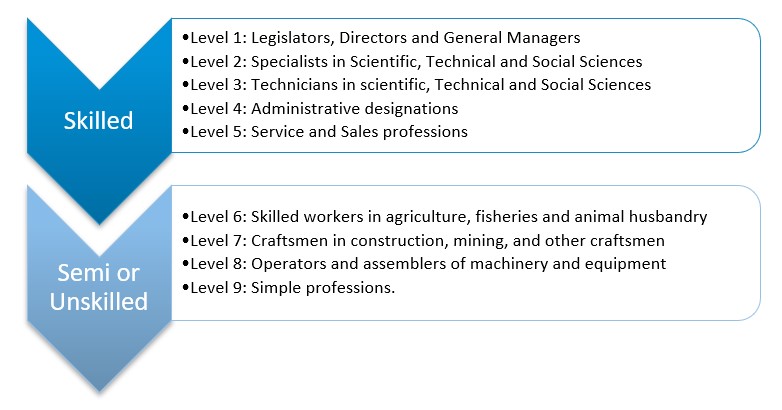
Country / Territory
Related contacts
Related insights
Related offices
Related contacts
Related insights
Related offices
Related contacts
Related insights
Related offices
By: Shoaib Khaleeli
In part two of this blog series on Emiratisation, Immigration Manager Shoaib Khaleeli follows his recent summary of the UAE's new regulations with an outline of the specifics of the Emiratisation calculation and how employers can use it to ensure compliance.
Understanding Skilled Employees
Emiratisation Rate =
Total Number of Skilled Nationals in the Establishment
Total Number of Skilled Employees
In addition to understanding Emiratisation requirements, it is also important to learn about the calculation used, as each element has an impact on the overall score. In order to understand the denominator of the formula above, having a clear definition of what the MOHRE considers a “skilled worker” is necessary.
The MOHRE classifies employment into nine professional levels according to the International Standard Classification of Occupations (ISCO), issued by the International Labour Organization. For simplicity, the MOHRE job title framework is separated into two sections:

Furthermore, a worker is classified as skilled employee if they fulfill the following conditions:
- The worker must be at a professional level (one amongst first to fifth level mentioned above);
- The worker has obtained a certificate higher than the secondary certificate or an equivalent certificate;
- The certificate must be attested by the competent authorities; and
- The monthly salary (excluding commission) of the worker must not be less than AED 4,000.
Which UAE Nationals are included in your Emiratisation Rate?
Examining the numerator in the equation, “Total Number of Skilled Emirati Nationals in the Establishment,” is also important.
For the UAE nationals associated with the entity to count towards the Emiratisation rate, companies need to ensure that the UAE nationals are registered as skilled workers as defined above, and also follow the below criteria:
- The UAE nationals must possess a valid work permit under that company;
- The UAE nationals' wages shall be paid through the Wages Protection System or any other approved wage system;
- The UAE nationals must be registered in the approved pension funds in the country; and
- There should be a contractual relationship between the UAE nationals and the company, adhering to Labour Law, executive regulations and cabinet decisions.
The above requirements of the law, when translated into practise, would mean that the UAE nationals would have to complete all the onboarding steps, including pension registration, to be counted in a company’s Emiratisation ratio.
This could mean a potential time gap of weeks or months associated with the effective hiring of UAE nationals, from the time of hire to when they are effectively reflected on the authorities’ systems. As the timelines and processes can vary from case to case, ensuring the efficient and proactive management of the entire process is paramount.
Need to know more?
Please look out for part three of this blog series next week, which will delve deeper into the impacts of Emiratisation-related non-compliance.
For further information and advice on this topic, please contact Immigration Manager Shoaib Khaleeli at [email protected]. This blog was published on 11 January 2023, and due to the circumstances, there are frequent changes.
To keep up to date with all the latest updates on global immigration, please visit our dedicated COVID-19 site, subscribe to our alerts and follow us on LinkedIn, Twitter, Facebook and Instagram.
Country / Territory
Related contacts
Related insights
Related offices
Related contacts
Related insights
Related offices
Related contacts
Related insights
Related offices
Explore more at Fragomen

Video
Partner Diana Quintas outlines key early career visa pathways and practical considerations for employers and graduates navigating entry-level immigration options.

Fragomen news
The Montreal office has added Partner Julie Lessard and Counsel Elsa Agostinho and Sophia Khanzadian to strengthen its immigration services.

Blog post
Destination Services Director Christine Sperr examines how housing market reforms, rent stabilization measures and cost-of-living dynamics in Saudi Arabia are influencing workforce mobility, compensation planning and long-term settlement strategies under Vision 2030.

Blog post
Manager Dr Adela Schmidt and Senior Associate Isabel Schnitzler analyse the European Commission’s infringement proceedings against Germany concerning its Vander Elst visa requirements for third-country nationals providing short-term cross-border services and explain why current compliance obligations remain unchanged.

Blog post
Latin America & the Caribbean Managing Partner Leonor Echeverria, Senior Associates Sarah Blackmore and Sonya Cole and Senior Regional Knowledge Manager Laura Weingort examine renewed energy interest in Venezuela and outline key immigration pathways, procedural constraints and strategic considerations for compliant talent deployment.

Media mentions
Senior Manager Andreia Ghimis highlights how the EU’s new migration strategy could create opportunities for employers while increasing compliance requirements.

Awards
Partner Julia Onslow-Cole is recognised in the Spears 500 guide to leading private client advisers, reflecting her experience advising high-net-worth individuals, families and global businesses on complex UK and European immigration and mobility strategies.

Media mentions
Partner Abeer Al Husseini discusses increased scrutiny of Saudi business visas in AGBI, highlighting stricter review of short-term entry used for operational work and the implications for regional employers.

Awards
Australia and New Zealand Managing Partner Teresa Liu, Partner Charles Johanes, Practice Leaders Hedvika and Leader Ben Lear and Senior Associate Hannah Scanlan are recognized in the 2026 edition of Doyle’s Guide as leading immigration practitioners in Australia.

Awards
Fragomen is ranked Band 1 for Immigration: Business in the Chambers Global 2026 Guide, marking two decades of recognition since 2006. The firm is also the only firm ranked Band 1 in the Global: Multi-Jurisdictional Immigration category and receives additional individual recognitions in the USA: Business Immigration rankings.

Media mentions
Partner Rick Lamanna provides insight to Buffalo Toronto Public Media on potential IRCC processing challenges as Canada prepares for increased visa demand ahead of the 2026 FIFA World Cup.

Video
Partner Diana Quintas outlines key early career visa pathways and practical considerations for employers and graduates navigating entry-level immigration options.

Fragomen news
The Montreal office has added Partner Julie Lessard and Counsel Elsa Agostinho and Sophia Khanzadian to strengthen its immigration services.

Blog post
Destination Services Director Christine Sperr examines how housing market reforms, rent stabilization measures and cost-of-living dynamics in Saudi Arabia are influencing workforce mobility, compensation planning and long-term settlement strategies under Vision 2030.

Blog post
Manager Dr Adela Schmidt and Senior Associate Isabel Schnitzler analyse the European Commission’s infringement proceedings against Germany concerning its Vander Elst visa requirements for third-country nationals providing short-term cross-border services and explain why current compliance obligations remain unchanged.

Blog post
Latin America & the Caribbean Managing Partner Leonor Echeverria, Senior Associates Sarah Blackmore and Sonya Cole and Senior Regional Knowledge Manager Laura Weingort examine renewed energy interest in Venezuela and outline key immigration pathways, procedural constraints and strategic considerations for compliant talent deployment.

Media mentions
Senior Manager Andreia Ghimis highlights how the EU’s new migration strategy could create opportunities for employers while increasing compliance requirements.

Awards
Partner Julia Onslow-Cole is recognised in the Spears 500 guide to leading private client advisers, reflecting her experience advising high-net-worth individuals, families and global businesses on complex UK and European immigration and mobility strategies.

Media mentions
Partner Abeer Al Husseini discusses increased scrutiny of Saudi business visas in AGBI, highlighting stricter review of short-term entry used for operational work and the implications for regional employers.

Awards
Australia and New Zealand Managing Partner Teresa Liu, Partner Charles Johanes, Practice Leaders Hedvika and Leader Ben Lear and Senior Associate Hannah Scanlan are recognized in the 2026 edition of Doyle’s Guide as leading immigration practitioners in Australia.

Awards
Fragomen is ranked Band 1 for Immigration: Business in the Chambers Global 2026 Guide, marking two decades of recognition since 2006. The firm is also the only firm ranked Band 1 in the Global: Multi-Jurisdictional Immigration category and receives additional individual recognitions in the USA: Business Immigration rankings.

Media mentions
Partner Rick Lamanna provides insight to Buffalo Toronto Public Media on potential IRCC processing challenges as Canada prepares for increased visa demand ahead of the 2026 FIFA World Cup.



